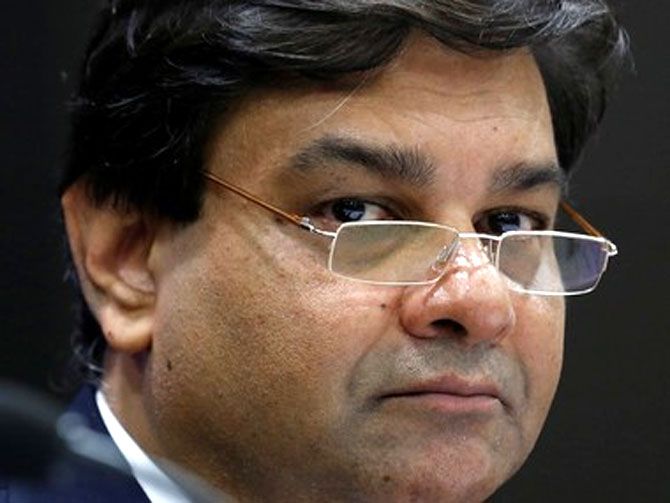 | « Back to article | Print this article |
RBI deputy governor N S Vishwanathan has said the new framework was in line with the Insolvency and Bankruptcy Code guidelines.

The February 12 circular of the Reserve Bank of India on bad debt recognition norms has miffed bankers and corporates alike but sources in the know of the central bank's thinking maintain that it is unlikely to budge from its stance.
RBI, the sources say, has taken away leeway from bankers on postponing the problem of bad debt. And, apart from scrapping the earlier restructuring schemes, there is nothing much it has done that is not in line with the now functioning Insolvency and Bankruptcy Code.
RBI feels banks have clearly abused its earlier rules for restructuring of loans.
"Look at the SDR (strategic debt restructuring) schemes that banks invoked on about 20 accounts. They managed to resolve just one account," said a senior RBI official, who did not want to be named.
Then RBI governor Raghuram Rajan, in February 2016, goaded banks to cleanse their accounts. Rajan said instead of using tools to solve the problem, banks had used the restructuring norms such as SDR, Joint Lenders Forum, the 5/25 loan schemes, etc, "perversely, to avoid it".
Current RBI governor Urjit Patel's criticism of banks on this count was even harsher.
"Rather than resolving stressed credit problems swiftly, banks -- either through loan-level 'fudges' or by refusal to recognise the true asset quality of credits -- have allowed promoters in charge of enterprises to have a soft landing," Patel said in a speech in mid-March.
So, as a sledgehammer measure to fix the ailment, RBI on February 12 said the existing restructuring tools would no longer be available for banks.
And, if an account of (to start with) Rs 20 billion and above, fails to service its loans within 91 days, it would be considered a 'default'; a Resolution Plan (RP) will have to be readied. This plan must have a standard clause, that at least 20 per cent of the dues on the principal amount, and interest due on this, has to be repaid within one year of implementing the plan.
If the company fails to do so, it would be termed a fresh default.
Bankers are unnerved by this clause, where a company is termed a defaulter if it fails to repay within 91 days. They want it changed. A lot of companies fail to pay within 180 days but make good on their dues only 10-20 days down the line; there is always temporary liquidity mismatch in all companies, bankers say.
Clearly, companies are also not happy.
"This is a draconian step," said a senior official at a large corporate group. "If you see the repayment pattern, most corporate groups do cause overdues for various business reasons but that doesn't mean they are defaulters. If you term them defaulters, which is a technical definition and not a reality, banks won't be able to lend further to the company. This will lead to actual defaults."
Rationale
Bankers are hoping RBI will budge on its one-day default norm. They have lobbied with it and with the central government to reconsider, besides asking for other relaxations. It appears RBI has expressed strong objection to toning down the regulation, even as some government officials have sided with the banks.
Senior bankers say RBI might not agree to the host of relaxations sought through the Indian Banks Association but there are indications that the one-day default condition could be changed.
However, RBI has told the government and banks that the clause is presently for only those accounts above Rs 20 billion of exposure. These large accounts are relatively insulated from an uncertain repayment pattern. This mismatch happens mainly on smaller accounts that are dependent on large companies which often don't repay their dues on time.
"These large accounts are mainly family-owned businesses and those accounts have abused the banking system repeatedly. RBI has its regulatory protection for companies in micro, small and medium enterprises. This kind of restrictive timeline would never be applicable for MSME accounts that face cash flow problems," said a person in the know of RBI's thinking.
Bankers have also objected on the 180-days resolution period. To this, RBI has reportedly told banks and the government that, in effect, companies are getting a full year to repay their debt.
"You get 180 days under the latest framework and then, when you are referred to the IBC, you get another 180 days. Only after 360 days could banks consider selling the company to recover their dues," said the person cited earlier, adding: "Banks want to get back on their own comfort zone of taking years to resolve the issue. By then, the enterprise value of the assets gets eroded and banks seem to have no problem taking a deep haircut (write-off)."
What RBI said
Asked by Business Standard at his April 5 policy press conference about bankers' concern on the latest norms, RBI deputy governor N S Vishwanathan said the framework was in line with the IBC guidelines.
"The reasons why we introduced these revised guidelines is because we believe the IBC has given a framework for the resolution of stressed assets. And, the developments (therein) have given us some comfort that it will go in the right direction," he had said.
"The second part is that default definition is one-day but an NPA by definition means 90 days. So, we do not say that this circular by itself should result in more NPAs coming. What we have, of course, done is to withdraw those schemes which resulted in banks postponing their recognition (of loan turning into an NPA)," he added.